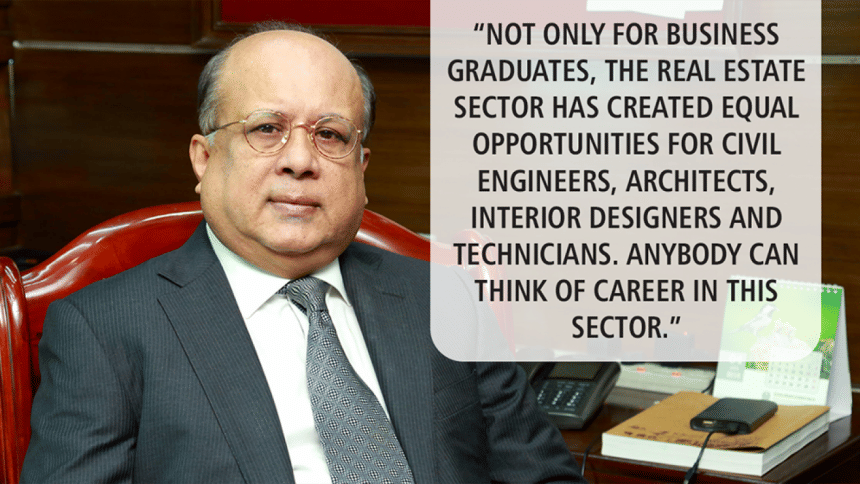What real estate has to offer

What's your take on the present scenario of the real estate market in Bangladesh?
In the last 30 years, the real estate sector in our country has seen massive growth because of the shortage of homes for the increasing population and the apathy of the government in solving the crisis. Private developers have brought about a massive change in the city's skyline, albeit in an unplanned way to some extent. This happened because of the mass migration towards Dhaka as people flocked to the capital in pursuit of better livelihood, education, healthcare and living condition. With time, the radius of Dhaka city has grown, and it is now touching the nearby districts. However, the real estate business has taken a dip even though the demand is still high.
The boom that we saw till 2012 has stopped suddenly. This could have happened because of the irresponsibility of some real estate companies as there are complaints against such companies of exploiting customers. However, the situation is improving with time.
What's the contribution of this sector to the economy in terms generating career scopes?
Directly and indirectly this sector has created immense job opportunities for the young generation. Once we used to import 80 percent of our ceramic tiles, but now because of the real estate sector, there are around 10 local ceramic companies. Machine-made bricks weren't there in the past, but now there are factories that make environmentally friendly bricks. Technicians and labourers have plenty of job opportunities. This business has created countless skilled construction workers who are now working abroad and sending remittance to Bangladesh. We have trained people and made a significant contribution in building a skilled workforce.
What can different educational backgrounds find in this sector?
There was a time when aspiring marketing graduates would look to build a career in FMCGs and MNCs, but over the last three decades the real estate sector has created a competitive job platform for them. Now we see many real estate experts; they have clear ideas of all local and international happenings in this sector. Not only for business graduates, the real estate sector has created equal opportunities for civil engineers, architects, interior designers and technicians. This sector needs a lot of customer relationship managers alongside engineers and business graduates. Anybody can think of a career in this sector.
Now many private universities offer degrees on engineering, construction and related subjects, and these students get employment in real estate. This is tremendous contribution to the country's economy.
This business will continue to grow, and many more backward linkage industries will flourish in the future. We are still importing pipes, fittings, and electrical fittings from China. But we can make these in our own country which will create more employment opportunities.
Where do you see this sector in the next 10 years?
More than 60 percent of the population in Dhaka live in rented houses; they are potential buyers. So this business will keep growing. I personally think that the government should have greater involvement here to foster planned development. The government should build the required infrastructure and implement it in partnership with private developers. Public Private Partnership is very much needed in the housing sector.
Mass people need housing, and we are here to serve them. But when we buy private land at high rates and build houses in partnership with land owners, the prices go up. This is the main reason behind the price hike of apartments. The government can take cheap land and hold a bidding amongst private developers which will bring fair competition to this sector. If the government becomes our major stakeholder, we will be able to offer accommodation for the mass people at an affordable rate.
What do you think are some obstacles in the development of this business?
Lack of government patronisation, I would say. This sector is ignored in the national budget, and I believe the government doesn't have sufficient data on this sector. It is time the government takes into consideration the tremendous contribution this sector has made to the economy.
What does it take to be a successful professional in the real estate business?
To be a successful professional in the field, one has to be hardworking as there's no shortcut success. When you're dealing with the people's hopes and dreams, you have to be committed and loyal so that potential buyers can trust you. People trust business professionals with commitment.
What's your take on the environmental considerations?
There are many problems, and some businessmen are the reason behind these problems. Land grabbers are the culprits behind the water-logging in Dhaka. Many big housing projects outside Dhaka are ill-planned and fill rivers and water-bodies to build housing projects. I think the government should be tougher on them.
Now we see everything evolving around Dhaka. This trend needs to stop. Fortunately, the government is creating fixed economic zones, which will create employment opportunities outside Dhaka. Many housing projects will be built there.
Also, North Bengal is neglected, but we can easily shift industries there. The government should hold a national dialogue and adopt a national policy to make this happen. There must be a national consensus on de-centralisation. Not only will this foster planned development, but it also will help the environment.
What role Rupayan is playing to make Dhaka better?
We are taking Dhaka out of Dhaka by building communities outside the capital. We want to be a pioneer in this regard. We are focussing more on connecting suburbs with the main towns to mobilise a part of the population outside Dhaka. I think we all have responsibilities to make our city a more liveable place. In this effort, everyone should be a stakeholder.

 For all latest news, follow The Daily Star's Google News channel.
For all latest news, follow The Daily Star's Google News channel. 



Comments